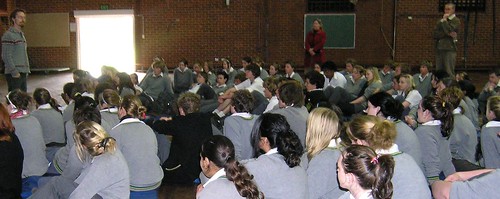Proximity and regularity are hard to achieve.
Let’s face it, we can live nearby and never actually inhabit the same space. You can live next to someone for 7 years and not even speak a word. Pretty tragic, but also pretty normal. Such is life in the burbs.
But if these first two criteria aren’t in place then what comes next doesn’t have a hope in hades!

Building Block 3. Depth – Ok, so we live nearby and we see each other regularly. That’s great, but if we are to missionaries then at some point we do want to talk with people about the bigger issues of life. Purpose, destiny, meaning, coffee etc.
Personally I find it very hard to sustain relationships that never progress beyond ‘Are Holden’s better than Fords?’ I get bored… very bored! I dis-engage. I drift away. Maybe that’s not good, but its who I am. I am happy to laugh, fart and discuss the footy, but if I never feel like I am actually getting to know a person then I start to move away.
Take away the ‘missionary’ aspect of my identity and I’d be just the same. I am happy to hear about a person’s sport, family, cars, renovations and vasectomy but if after a fair length of time I never actually get to meet the human being behind all that stuff then I will find it very hard to remain interested.
I also don’t believe we can speak of issues concerning the gospel while conversations remain superficial. The gospel immediately breaks into our whole worldview and challenges our understanding of what is important. It causes us to reflect on reasons for our existence and the way we are living our lives. It really does affect everything.
I certainly don’t think you need to be Christians to have relationships with depth, but I do think depth is unlikely to come without proximity and regularity.
This is where the workplace and the street get tricky. Both are able to provide proximity and regularity, but I’d suggest the workplace isn’t a great environment to go too deep. The nature of work means that you have to see each other every day and if the relationship goes pear shaped because of more indepth conversations then it becomes tricky to function well together. I reckon everyone likes to tread carefully in this zone because a lot is at stake. The street is similar, but roller doors provide the ability to withdraw if things go sour.
And speaking of the potential for things to go sour…
Building Block 4. Conflict If we are to speak of Jesus with people who don’t know him and don’t hold the same worldview as us then we need to accept that there will be differences and probably even some conflict/disagreement. I want to clarify that the ‘conflict’ I speak of isn’t
prophet the movie download
necessarily bad. Its a healthy part of a relationship that has gone beyond the superficial and I’d suggest that if we never disagree with our friends then it probably isn’t a genuinely healthy friendship.
I’m sure Grendel won’t mind me using him as an example here. We are mates – good mates and my life is the richer for having met this weird coffee obsessed public servant who seems to be a walking encyclopedia and who is equally concerned for the health of the local community as I am. But obviously we disagree about the basic issue of the existence of God. We have spoken of this numerous times and we have listened to each other’s respective journeys and current positions.
I guess we could have just skirted over this issue, but for both of us faith, church and spirituality has shaped us significantly so it would be hard to understand one another in the absence of some conversation here – even if we don’t come out agreeing on the same stuff.
There was something about the world I grew up in that required me to continually prove a ‘Grendel’ wrong, but I don’t live in that world any more. I’m not convinced its a world any missionary should live in. Apart from the fact that two relatively intelligent people (yes I’m still referring to Grendel and I…) are unlikely to argue one another to an opposite position it doesn’t seem to be the approach Jesus would take if he lived in our community. And although Paul was an argumentative bugger I doubt he would have sought to win a verbal stoush either.
However while Grendel and I are able to sustain a healthy friendship some people will not like our choice to follow Jesus and to speak of him in conversation. Some people will simply avoid us. They won’t invite us to parties. They will classify us as ‘religious folks’. And at times that will hurt. We have had that experience up here already and I’m sure we will again.
But let’s not let the occasional rejection stop us speaking of Jesus!
And I use the words ‘speaking of Jesus’ intentionally because while actions do speak louder than words, there is still a place for the verbal communication of the gospel, for speaking of how Jesus has revolutionised our life. We don’t need to be evangelistic nutbags to speak of Jesus, (see here) but if he is in our lives then inevitably (if we are being true to who we are) he will ‘leak out’.
Truthfully I believe some of us have become so soft that the slightest ‘knock’ for being Christians causes us to withdraw and never venture down that road again.
Time to toughen up folks!!
And I don’t mean we need to be aggressive, but if we believe that our message is valuable and our calling is to share that (in part verbally) then we just need to get over our jitters and speak up.
Not everyone will like it, but that’s ok.
I tend to think that if a relationship is built on proximity, regularity and depth then it will be able to sustain some conflict. If it can’t then it probably isn’t going to very durable anyway.





 EPYC actively resists watering down the gospel, tickling ears, shying away from the demands of discipleship, bending the knee to Principalities and Powers who avoid preaching Christ crucified. In EPYC workshops we trust Scripture has a power beyond our cheap four step summations of the Bible. EPYC don’t hide students from the Bible but openly explores solid exegesis of Biblical texts with students that aren’t Christian trusting that God’s Spirit is at work drawing us to all truth and that Jesus really is good news for all that our world is going through.
EPYC actively resists watering down the gospel, tickling ears, shying away from the demands of discipleship, bending the knee to Principalities and Powers who avoid preaching Christ crucified. In EPYC workshops we trust Scripture has a power beyond our cheap four step summations of the Bible. EPYC don’t hide students from the Bible but openly explores solid exegesis of Biblical texts with students that aren’t Christian trusting that God’s Spirit is at work drawing us to all truth and that Jesus really is good news for all that our world is going through.
 2. The biblical passage which Gandhi is referring to is Matthew 28:18-20. In part it reads, “teaching them to obey everything I have commanded you”. Is it the ‘mission’ of the God revealed in Jesus if we are not teaching people the practicalities of what Jesus taught? If we teach a theory of atonement and neglect to teach ‘converts’ to live Jesus’ way have we really made disciples? If we don’t teach giving to the needy in secret (instead of calling a press conference), to pray for God’s will of justice,peace and joy to be done (instead of our will or the will of our nation), to seek first God’s transforming presence (instead of careers or our agenda) to first remove the plank from our own eye (instead of judging others) and to love our enemies (instead of bombing them) have we really made followers, students, disciples of Jesus?
2. The biblical passage which Gandhi is referring to is Matthew 28:18-20. In part it reads, “teaching them to obey everything I have commanded you”. Is it the ‘mission’ of the God revealed in Jesus if we are not teaching people the practicalities of what Jesus taught? If we teach a theory of atonement and neglect to teach ‘converts’ to live Jesus’ way have we really made disciples? If we don’t teach giving to the needy in secret (instead of calling a press conference), to pray for God’s will of justice,peace and joy to be done (instead of our will or the will of our nation), to seek first God’s transforming presence (instead of careers or our agenda) to first remove the plank from our own eye (instead of judging others) and to love our enemies (instead of bombing them) have we really made followers, students, disciples of Jesus?

